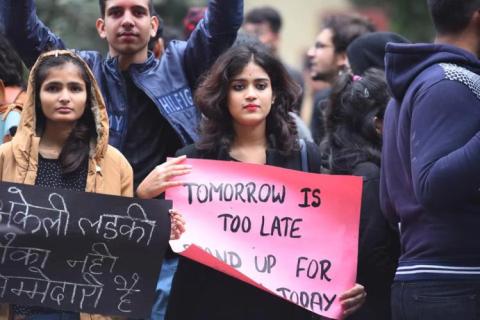When an aggrieved woman complainant approaches the police for lodging FIR (First Information Report), the ordeal for her begins at that point itself. Police Station in charge is never keen to record FIR. Only money power or personal/political clout does work.
Successive Union Governments have taken several administrative and legal measures to empower, secure women and minimize crimes against them. But unfortunately, crimes against women have been increasing year on year except in 2020 when such crimes came down by 8.3 per cent due to lockdown and massive job losses, according to the National Crime RecordsBureau (NCRB). This indicates that government is not honest about protection of women and maintaining a façade of propaganda to hoodwink the people despite 39 laws having been enacted to empower women of India during the last two centuries. Reasons sited for ever increasing such crimes are patriarchy, misogyny, rampant discrimination against women, their commoditization, objectification and, above all, pervasive rampant corruption and politicization of police and policing as per experts.
When an aggrieved woman complainant approaches the police for lodging FIR (First Information Report), the ordeal for her begins at that point itself. Police Station in charge is never keen to record FIR. Only money power or personal/political clout does work. Even after registration of FIR, without money changing hands or all sorts of clouts and connections, investigations in all such cases are generally botched up. There are a plethora of Supreme Court directions and government instructions for the police to register FIR; the ground reality being altogether different.
There are Standard Operating Procedures (SOP) revised from time to time to tackle, curb and deal with and sensitise police on crimes against women forming part of their training module and police manual. Since police as a law enforcing agency is seemingly very corrupt, seldom law abiding neutral force, communal, biased, least friendly cooperating agency in the maintenance of social harmony and peace and highly politicized working as tool of political power to frame and implicate innocent adversaries in bogus cases under dreaded anti-terror and anti-national laws like UAPA, NSA and similar other draconian laws in violation of their oath of office and allegiance to the Constitution of India, crimes against women will continue to rise and nothing meaningful will happen.
Bureau of Police Research & Development (BPR&D) in the Union Ministry of Home Affairs (MHA) has prepared a Hand Book on Standards Operating Procedures (SOP) for strengthening police capacity to deal with crimes against women. This Hand Book has been circulated to all States and Union Territories for their SOP in tackling cases of crimes against women. In addition, seven Advisories, one D.O. letter and recommendations of Parliamentary Standing Committee Report No.233 have, since 2014, been sent by the MHA to the States and Union Territories asking them to strengthen mechanism for dealing with crimes against women, especially SOPs on registration of FIRs including details of total zero FIRs filed and disposed of and training to police personnel on handling crimes against women using BPR&D SOP. Parliamentary Standing Committee Report has asked the Union Government to direct State police that the SOPs on registration of FIRs should include guidelines to police to record reasons for delay in reporting of crimes by the complainants to the police. Besides, the Report calls for informing all police personnel of a police station that they know Respondents and Investigators and its inclusion in the police-training module.
MHA has asked States and Union Territories to replicate Crime Analytics by Delhi Police in prevention of street crimes through crime mapping and identification of hot spots for reinforced action. Similar action, as recommended by Parliamentary Standing Committee, may be emulated in other metropolitan cities, the Advisories say. All the consolidated decisions have been provided to States and Union Territories with direction to them for resolute action in the matter and monitoring of the implementation at the ground level to calibrate the action. A new format of FIRs on crimes against women has also been sent to all states and union territories police under Section 154 of the Criminal Procedure Code for inclusion of date and timing of dispatch to the court. New FIR format has also been sent to BPR&D and NCRB.
Notwithstanding all such advices and instructions to police, crimes against women will not decrease unless there is perceptible improvement in the performance of police. The way forward, in the circumstances, is to make police accountable to the people in keeping with the rule of law based system of democratic constitutional governance, insulating police from political influences, making them corruption free, responsive, neutral, unbiased and fair law enforcing agency as per the various reports of commissions and committees on police reforms beginning with the first Police Reforms Commission headed by Dharamvira and the directions of the Supreme Court on police reforms contained in the 2006 Prakash Singh judgment lest the democracy in India should be a sham and electoral autocracy turning the country into a police state!
